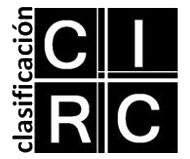Representation of minorities or market strategy?
Changes in Rede Globo from "Social Television"
DOI:
https://doi.org/10.24215/16696581e422Keywords:
Social Television, Minorities, Social demands, StrategiesAbstract
Social Television (Social TV) is the new way of socializing with the programming broadcast on television channels. There is an increasing concern among broadcasting organizations regarding the topics covered in their programming, due to the demand of Internet users who mostly consume social networks and demand that television adapt and debate issues that are inserted in the environment Social. Based on three examples broadcast on TV Globo in Brazil, we propose a reflection to demonstrate how the phenomenon of Social Television occupies spaces for discussion between TV and the Internet and to question whether the changes that occur in the programming of TV Globo aim to satisfy the demands of the mentioned minorities or simply seek to maintain their leadership position, through the use of social struggles. The results show that the large mass media adapt to the capitalist system to maintain its power, often through the modes of production of profit guaranteed by the appropriation of characteristics and demands of social minorities.
Downloads
References
Cruz, B. (2015). Classe C e o Fenômeno Social TV no Brasil. Revista Administração em Diálogo.
São Paulo, Brasil, Vol. 17, número 3, pp.106-128.
Habes, M. (2019). The influence of personal motivation on using social TV: A Uses and Gratifications Approach. International Journal of Information Technology and Language Studies (IJITLS).Vol. 3, Issue, pp. 32-39. Recuperado de https://www.researchgate.net/profile/Mohammed_Habes2/publication/332592986_The_influence_of_personal_motivation_on_using_social_TV_A_Uses_and_Gratifications_Approach/links/5cbf4a2492851c8d22004c48/The-influence-of-personal-motivation-on-using-social-TV-A-Uses-and-Gratifications-Approach.pdf
McNutt, M (2018). The 100 and the Social Contract of Social TV. In "Social TV Fandom and the Media Industries, edited by Myles McNutt, Special issue. Transformative Works and Cultures, no. 26. Recuperado de https://journal.transformativeworks.org/index.php/twc/article/view/1297/919.
McNutt, M. (2018). "Social TV Fandom and the Media Industries". Communication & Theatre Arts Faculty Publications. Recuperado de https://digitalcommons.odu.edu/communication_fac_pubs/35
Merceron, A.; Atkin, D. (2020). Examining the Role of Individual Differences and Motivation in Predicting Social TV Viewing Behaviors among Young Adults in the U.S..The Journal of Social Media in Society, Vol. 9, No. 1, pp. 253-274.
Meniconi, J. (2005). De Olho no Big Brother Brasil: A performance mediada pela TV. (Tesis de maestria). Recuperado de
http://www.dominiopublico.gov.br/pesquisa/DetalheObraForm.do?select_action=&co_obra=27729
Rocha, D (2009). Reality TV e reality show: ficção e realidade na televisão. Revista da Associação Nacional dos Programas de Pós-Graduação em Comunicação - E-compós. Brasília, Vol. 12, número 3, pp. 1-16.
Sigiliano, D; Cavalcanti, G y Borges, G. (2017). Feminismo e TV Social: a repercussão dos telespectadores interagentes sobre o empoderamento de Dana Scully em The X-Files. Intercom- Sociedade Brasileira de Estudos Interdisciplinares da Comunicação. 40º Congresso Brasileiro de Ciências da Comunicação.Recuperado de https://portalintercom.org.br/anais/nacional2017/resumos/R12-0573-1.pdf
Wolton, D. (2006). Elogio do grande público: uma teoria crítica da televisão. Trad. José R. Siqueira São Paulo: Ática.
Downloads
Published
How to Cite
Issue
Section
License
La aceptación de un original por parte de la revista implica la cesión no exclusiva de los derechos patrimoniales de los/as autores/as en favor del editor, quien permite la reutilización, luego de su edición (postprint), bajo una Licencia Creative Commons Atribución-NoComercial-CompartirIgual 4.0 Internacional (CC BY-NC-SA 4.0)
Acorde a estos términos, el material se puede compartir (copiar y redistribuir en cualquier medio o formato) y adaptar (remezclar, transformar y crear a partir del material otra obra), siempre que a) se cite la autoría y la fuente original de su publicación (revista y URL de la obra), b) no se use para fines comerciales y c) se mantengan los mismos términos de la licencia.
La cesión de derechos no exclusivos implica que luego de su edición (postprint) en Question las/os autoras/es pueden publicar su trabajo en cualquier idioma, medio y formato; en tales casos, se solicita que se consigne que el material fue publicado originalmente en esta revista.
Tal cesión supone, también, la autorización de los/as autores/as para que el trabajo sea cosechado por SEDICI, el repositorio institucional de la Universidad Nacional de La Plata, y sea difundido en las bases de datos que el equipo editorial considere adecuadas para incrementar la visibilidad de la publicación y de sus autores/as.
Asimismo, la revista incentiva a las/os autoras/es para que luego de su publicación en Question depositen sus producciones en otros repositorios institucionales y temáticos, bajo el principio de que ofrecer a la sociedad la producción científica y académica sin restricciones contribuye a un mayor intercambio del conocimiento global.















































